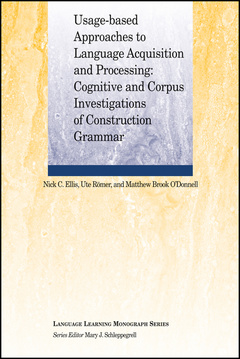Usage-Based Approaches to Language Acquisition and Processing Cognitive and Corpus Investigations of Construction Grammar Language Learning Monograph Series
Auteurs : Ellis Nick C., Römer Ute, O'Donnell Matthew Brook
Directeur de Collection : Schleppegrell Mary J.

Nick C. Ellis, Ute Römer, and Matthew Brook O'Donnell present a view of language as a complex adaptive system that is learned through usage. In a series of research studies, they analyze Verb-Argument Constructions (VACs) in first and second language learning, processing, and use. Drawing on diverse epistemological and methodological perspectives, they show how language emerges out of multiple experiences of meaning-making. In the development of both mother tongue and additional languages, each usage experience affects construction knowledge following general principles of learning relating to frequency, contingency, and semantic prototypicality. The implications of this work will be of value to students and scholars from a wide range of disciplinary interests in language and learning.
"This is an impressive volume that will inspire researchers for generations to come. Focusing on the construction and acquisition of language, it combines a comprehensive synthesis of theory with a detailed account of extensive empirical work."
—Susan Hunston, University of Birmingham
"This book is a phenomenal synthesis of a formidable research program. In a feast of corpus, psycholinguistic, acquisitional, and simulation evidence, the authors’ bold theoretical insights advance knowledge about human language to unprecedented levels."
—Lourdes Ortega, Georgetown University
"The authors present a superb synthesis of approaches to verb-argument constructions and convincingly demonstrate the close links between lexical patterning and constructional meaning. An absolute must-read for anyone interested in usage-based approaches to language learning."
—Ewa Dabrowska, University of Northumbria at Newcastle
"This book represents an outstanding achievement. The authors illustrate why the most exciting work in the language sciences today is conducted across disciplinary boundaries. Working at the intersection of experimental, computational, and corpus-based approaches, their research inspires us to look beyond our own disciplines to observe language data from all angles."
—Patrick Rebuschat, Lancaster University
Volume 66, Supplement 1
Series Editor's Foreword 15 - 17
Acknowledgements 19 - 20
Chapter 1 Constructions and Usage-based Approaches to Language Acquisition 23 - 44
1.1 Introduction 23
1.2 Construction Grammar 26
1.3 Basic-Level Constructions and Embodiment 28
1.4 Formulaic Language and Corpus Approaches 29
1.5 Inseparability of Lexis, Grammar, and Semantics 30
1.6 Verb-Argument Constructions (VACs) 32
1.7 Exemplar-based Abstraction 33
1.8 Construction Processing is Probabilistic 35
1.9 Construction Processing is Rational 37
1.10 VAC Structural Priming 39
1.11 VAC Priming in Dialogic Alignment 41
1.12 Guide to the Volume 42
Chapter 2 Determinants of Construction Learning 45 - 68
2.1 Introduction 45
2.2 Frequency Effects 45
2.3 Categorization, Meaning, and Prototypes 59
2.4 Contingency: Associations of Form and Function 61
2.5 Salience and Perception of Linguistic Forms 64
2.6 Implicit and Explicit Learning 64
2.7 The Interconnectedness of Learning Determinants 67
Chapter 3 VACs in Usage 69 - 97
3.1 Introduction 69
3.2 Methods 71
3.3 Findings 88
3.4 Summary Conclusions 96
Chapter 4 VACs in L1 Knowledge and Processing 99 - 121
4.1 Introduction 99
4.2 Experiment 1 101
4.3 Experiment 2 110
4.4 Discussion of Findings 114
4.5 Summary Conclusions 120
Chapter 5 VACs in L2 Knowledge and Processing 123 - 153
5.1 Introduction 123
5.2 Language Typology and Verb Semantics 124
5.3 Data Collection 126
5.4 Methods of Analysis 127
5.5 Results from Analysis 1 130
5.6 Results from Analysis 2 135
5.7 Discussion of Findings 147
5.8 Summary Conclusions 151
Chapter 6 Online Processing of VACs 155 - 185
6.1 Introduction 155
6.2 Experiment 1: VAC Recognition Threshold 157
6.3 Experiment 2: Naming Latency 164
6.4 Experiment 3: Lexical Decision 167
6.5 Experiment 4: Lexical Decision of Interposed Constituents 170
6.6 Experiment 5: Judging the Meaningfulness of VACs 173
6.7 General Discussion 176
6.8 Summary Conclusions 183
Chapter 7 VACs in Parent and Child Language (Written With David C. Ogden) 187 - 216
7.1 Introduction 187
7.2 Data and Method 190
7.3 Results 197
7.4 Discussion 209
7.5 Summary Conclusions 214
Chapter 8 VACs in L2 Acquisition 217 - 239
8.1 Introduction 217
8.2 Method 220
8.3 Results: VACs in ESL 224
8.4 Summary Conclusions 235
Chapter 9 Computational Models of Language Usage, Acquisition, and Transmission 241 - 278
9.1 Introduction 241
9.2 Connectionist Simulations of Acquisition 242
9.3 Modelling VAC Acquisition 245
9.4 Agent-based Simulations of The Ecology of Usage 258
9.5 Agent-based Simulations of VAC Usage and Intergenerational Transmission (Written With Krishna Bathina) 264
9.6 Summary Conclusions 277
Chapter 10 VAC Usage, Processing, Acquisition, and Transmission 279 - 312
10.1 Introduction 279
10.2 Usage 279
10.3 Processing 284
10.4 Acquisition 292
10.5 Language Learning and Instruction 298
10.6 Modeling Acquisition 303
10.7 Social Usage 306
10.8 Issues of Causality 307
10.9 Emergentism and LaCAS 310
References 313 - 352
Index 353 - 358
Nick C. Ellis is Professor of Psychology, Professor of Linguistics, and Research Scientist in the English Language Institute at the University of Michigan. His research interests include language acquisition, cognition, emergentism, corpus linguistics, cognitive linguistics, applied linguistics, and psycholinguistics He serves a General Editor of Language Learning.
Ute Römer is an Assistant professor in the Department of Applied Linguistics and English as a Second Language at Georgia State University. Her research interests include discourse analysis, psycholinguistics, syntax, corpus linguistics, and construction grammar, among others. She serves on a range of editorial and advisory boards of professional journals and organizations, and is co-editor of the Studies in Corpus Linguistics book series.
Matthew Brook O'Donnell is a Research Assistant Professor at the Annenberg School for Communication at the University of Pennsylvania. His research interests include social psychology, communication and media, quantitative social research, pragmatics, syntax, and morphology.
Date de parution : 06-2016
Ouvrage de 316 p.
14.7x22.6 cm
Disponible chez l'éditeur (délai d'approvisionnement : 12 jours).
Prix indicatif 44,92 €
Ajouter au panier


